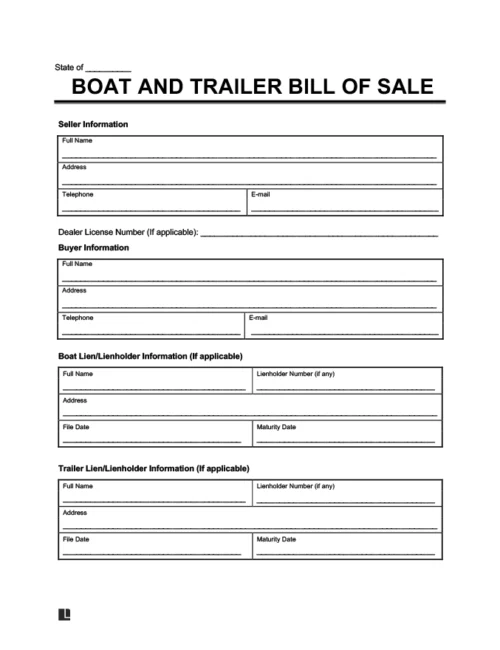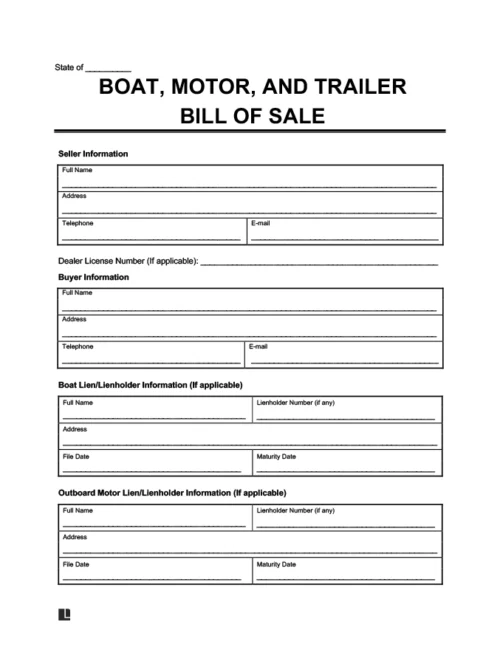A trailer bill of sale is a legal document outlining the details of a trailer sale, including its price, condition, and associated warranties or guarantees.
By State
- Alabama
- Alaska
- Arizona
- Arkansas
- California
- Colorado
- Connecticut
- Delaware
- District of Columbia
- Florida
- Georgia
- Hawaii
- Idaho
- Illinois
- Indiana
- Iowa
- Kansas
- Kentucky
- Louisiana
- Maine
- Maryland
- Massachusetts
- Michigan
- Minnesota
- Mississippi
- Missouri
- Montana
- Nebraska
- Nevada
- New Hampshire
- New Jersey
- New Mexico
- New York
- North Carolina
- North Dakota
- Ohio
- Oklahoma
- Oregon
- Pennsylvania
- Rhode Island
- South Carolina
- South Dakota
- Tennessee
- Texas
- Utah
- Vermont
- Virginia
- Washington
- West Virginia
- Wisconsin
- Wyoming
What Is a Trailer Bill of Sale?
A trailer bill of sale records the transaction involving the sale and purchase of a trailer, an unpowered vehicle towed by a powered vehicle. Most states’ Departments of Motor Vehicles (DMVs) require the buyer to present a bill of sale so they can register their trailer.
Legal Considerations
- Is It Required? You need a bill of sale to register your trailer.
- Does It Need to be Notarized or Witnessed? It depends on your state, but you may need a notary public or witnesses present when both the buyer and seller sign the document.
A trailer bill of sale is essential for both buyers and sellers:
Benefits for Buyers
- Provides proof of ownership
- Verifies you’re purchasing what the seller advertised
- Offers legal protection if someone steals your item or if other future disputes arise
- Helps with registration and the transfer of the title to your name
- Helps you determine how much sales tax you owe for the purchase
Benefits for Sellers
- Prevents disputes and misunderstandings with the buyer
- Releases you from future liabilities arising from the trailer
- Provides proof of the transaction
- Shows proof of income from the sale for tax purposes
Types of Trailers for a Bill of Sale
Here are some types of trailers you may record in your bill of sale when you purchase or sell one:
- Utility trailers: Utility trailers are open-top trailers with versatile purposes. For example, you can use them to move furniture or haul garden supplies.
- Enclosed trailers: Enclosed trailers have coverings that protect the cargo inside from the weather and road elements.
- Boat trailers: Boat trailers contain special features to transport boats safely.
- Dump trailers: Dump trailers have hydraulic lifts to transport and dump materials like gravel and dirt.
- Flatbed trailers: Flatbed trailers are flat and open, allowing their owners to transport oversized items that don’t fit in standard trailers.
How to Sell a Trailer
Step 1 – Clean and Prepare
The first step is to clean the trailer, make any necessary repairs or improvements, and remove all personal belongings. Preparing the trailer for sale in this manner can increase its value and make it more appealing to potential buyers.
Take interior and exterior photos to capture the trailer’s condition.
Step 2 – Determine the Market Value
Before selling, you need to determine its market value. You can research similar trailers in your area and compare their prices. Consider using online resources like TrailersUSA.com. You may also want to consult a professional appraiser for an accurate valuation.
Step 3 – Advertise the Trailer
Once you have determined the market value, it’s time to advertise it for sale. You can list your trailer on online marketplaces, social media, and local classifieds. Here are some websites to use:
Ensure the ads include high-quality photos, detailed descriptions, and your contact information.
Step 4 – Screen Potential Buyers
As you receive inquiries about the trailer, it’s important to screen potential buyers to ensure their intentions are genuine and they have the funds to purchase it. You may want to ask for a deposit or proof of funds before scheduling a showing.
Step 5 – Meet with Potential Buyers
When you identify serious buyers, schedule a time for them to view the trailer in person. Allow them to inspect the trailer and answer any questions they have.
You can begin negotiating the sale price and terms if they show real purchase intent.
Step 6 – Fill Out and Sign the Bill of Sale
When filling out the form, be sure to include the following information:
- The date of the sale
- The names and contact information of the buyer and seller
- A description of the trailer, including the make, model, and year
- The vehicle identification number (VIN)
- The purchase price
- Any warranties or guarantees the seller includes in the sale
Once you’ve provided the above information, the buyer and seller should sign the document. Have both parties present photo identification to prove their identities.
Ensure the buyer and seller receive a copy of the signed document for their records.
Step 7 – Transfer Ownership of the Trailer
After executing the bill of sale, the buyer must take it to their local Department of Motor Vehicles (DMV) to transfer ownership. The buyer should also provide proof of insurance and pay any necessary taxes and fees.
Make sure to provide them with all necessary paperwork, including the bill of sale, title, and registration.
If the buyer doesn’t register with their state’s DMV, they won’t be able to haul the trailer legally on the road.
Required Documents to Register a Trailer
While the registration process may vary between states, here are some documents you might need to register your trailer:
- State-Issued ID: A state-issued ID, such as a driver’s license, helps you prove your identity.
- Application: A completed application shows your intent to register with your state’s DMV. You must obtain an application directly from your DMV.
- Statement of Transaction: A statement of transaction contains the terms and conditions of the sale.
- State-Specific Forms: Use a state-specific trailer bill of sale to verify your ownership and aid with the registration process.
- Title: Obtain the title from the original seller. If you purchased a new trailer, you may need to obtain a certificate of origin instead.
- Receipt for Paid Sales Tax: This receipt may be necessary to show your DMV you’ve paid the associated sales tax for the trailer.
- Proof of Insurance: Depending on your state, you may have to show proof of liability insurance for the trailer.
- Inspection Certificate: Your state may require a safety inspection for the trailer.
In addition to the above documents, you should also prepare to pay the associated fees for registering your trailer and any sales tax that comes with the process.
How to Write a Trailer Bill of Sale
Step 1 – Gather the Parties’ Details
Collect the buyers’ and sellers’ information. Include their name, address, phone number, and email address.
If applicable, you can include the lienholder’s information.
Step 2 – Fill in Trailer Information
Details you should provide include the following:
- Make
- Model
- Production year
- Color
- Body style
- Empty weight
- License plate number (if any)
- Vehicle identification number (VIN)
- Carrying capacity
- Length and width
- Title number
You should also include information about the condition of the trailer. Refer to these options:
- New
- Excellent
- Very Good
- Good
- Fair
You can write down any additional information, including the date of the sale, relevant to this documentation section.
Step 3 – Provide Terms of the Sale
In this section, you should explain how the parties conduct the sale. For example, you need to specify whether the sale is a gift. If it’s a gift, you must clarify the relationship between the buyer and seller.
If it’s not a gift, record the purchase price and payment method, and explain why the buyer is purchasing the trailer for less than the fair market value (if applicable).
Furthermore, specify if the buyer will buy the trailer “as is” and if the seller will make no guarantees or provide warranties. If both parties agree, the buyer can assume all responsibility once they complete the sale. The seller can provide exceptions to the “as is” condition at their discretion.
Step 4 – Sign the Form
Once the buyer and seller agree to all the terms in the bill of sale, both parties should sign the form. Your state may require a witness or notary signature for validation.
You can usually find these requirements on your state’s DMV website. Call or visit your local DMV office if you have trouble finding the requirements online.
Even if it’s not required, it’s a good idea to have a third party witness your signature and sign the document in case of a future dispute over the sale.
Depending on state requirements, the buyer and seller may need to file the filled form with the DMV or other governmental agencies. If you sell a boat, outboard motor, and trailer, another office, such as a marine board or recreational agency, may handle the transfer. You can learn how to register boats in your state on DMV Boat Registration and Licenses.
Trailer Bill of Sale Sample
Simple Trailer Bill of Sale
Use this bill of sale template to record the sale of a motorless boat or a boat with an internal motor and its trailer
Bill of Sale for Boat and Trailer
Frequently Asked Questions
Where Can I Find a Trailer VIN?
The VIN is typically on the trailer tongue or frame. You can also find it in the registration and title documents. If you have trouble locating the VIN, contact the manufacturer or a local DMV office for assistance.
Can I Sell a Trailer With Just a Bill of Sale?
Yes, you can sell a trailer with just a bill of sale and use this document as proof of ownership. However, certain states require a certificate of title for a legal transfer of ownership.
Can I Register a Trailer With a Bill of Sale?
You can register a trailer with a bill of sale. You may also need the title and other documents, depending on where you live. Check your state’s requirements to determine what you need.




